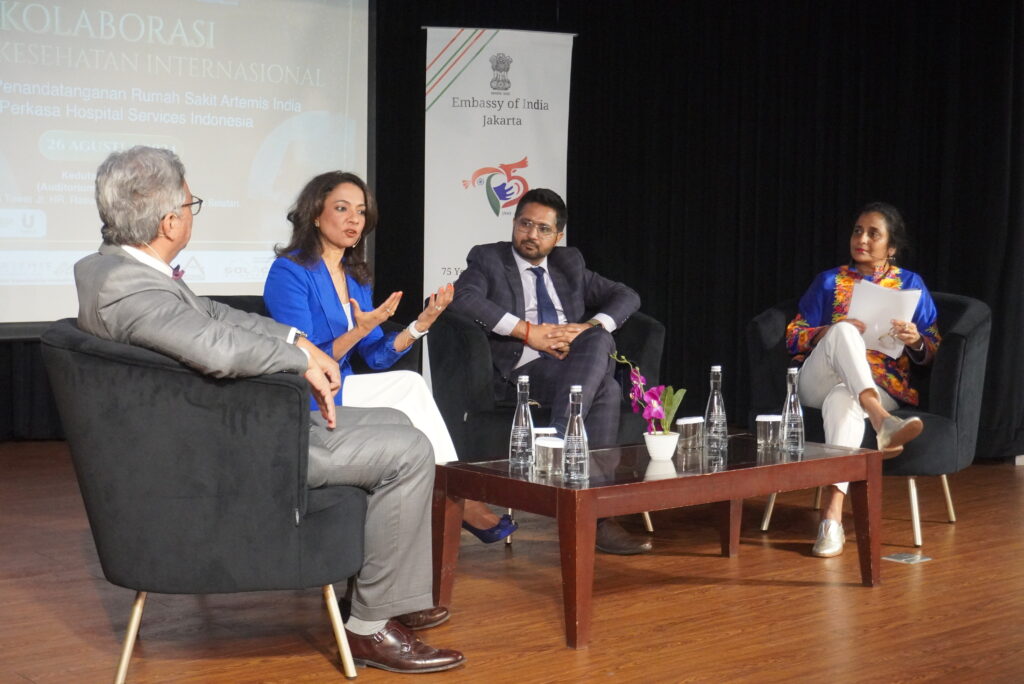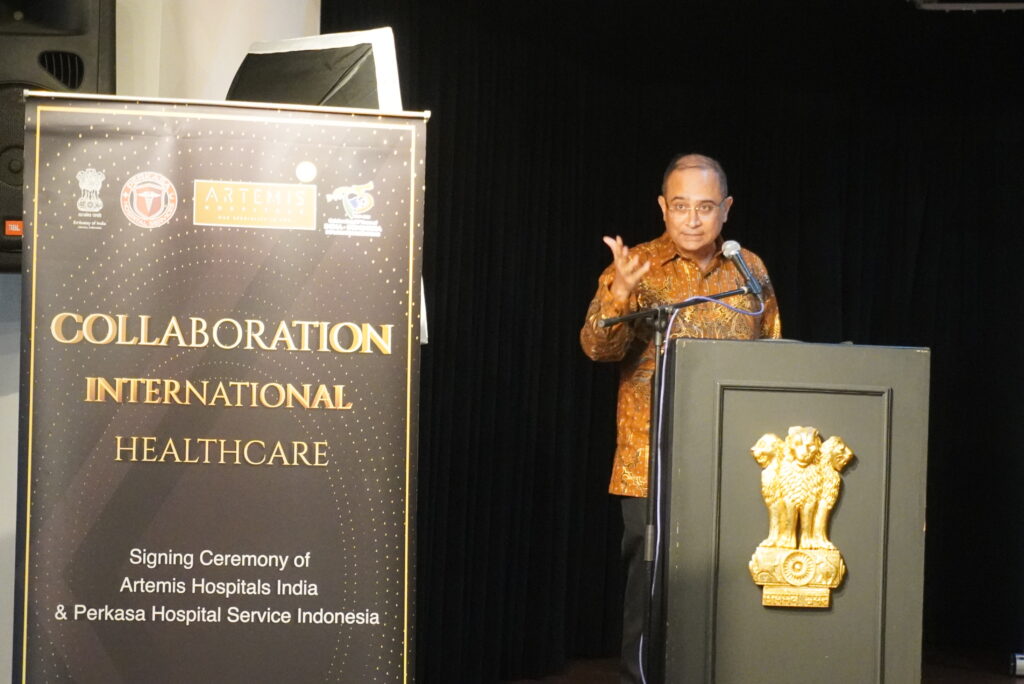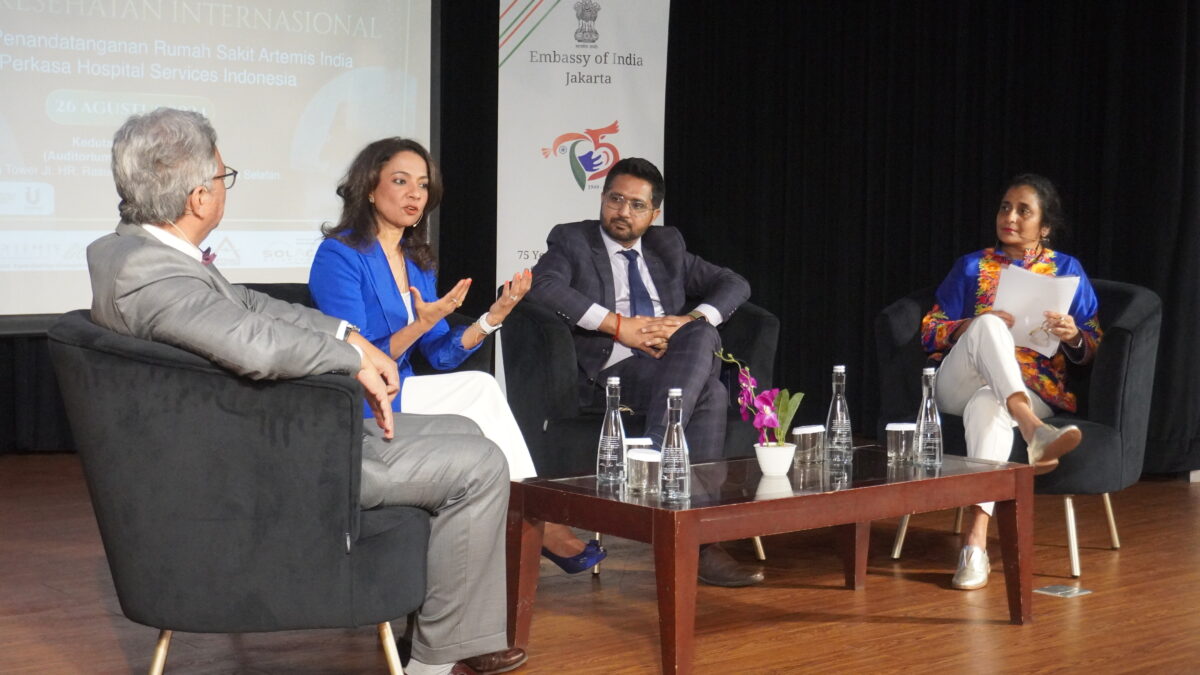
Jakarta, Indonesia – August 26, 2024: In a landmark move to fortify healthcare ties between India and Indonesia, Artemis Hospitals and Perkasa Hospital Services have announced a strategic partnership aimed at bridging healthcare gaps and enhancing medical collaboration across borders. The announcement was made during a pivotal event themed “Bridging Healthcare: India-Indonesia Synergy,” held at The Indian Embassy, Gama Tower, Jakarta. The event marked a significant milestone in the partnership, underscoring the commitment of both organizations to combine their strengths and expertise. It also featured an engaging panel discussion moderated by Ms. Poonam Sagar, Chairperson of the Indonesia India Business Forum (IIBF). The panel brought together a distinguished group of experts, including Mr. Septo Adjie, CEO of Perkasa Hospital Services; Ms. Niharika Yadav, President Director of AXA Financials Indonesia; and Dr. Vishal Arora, Chief Business Transformation at Artemis Hospitals.

The proceedings began with a compelling address from HE Sandeep Chakravorty, Ambassador of India to Indonesia and Timor Leste. Chakravorty highlighted the complementary healthcare strengths of both nations. “Indonesia excels in primary and secondary health care but faces challenges in tertiary care,” he noted. “Conversely, India is highly advanced in tertiary care but encounters difficulties at the primary and secondary levels.” He pointed to the collaboration between an Indian hospital chain and an Indonesian Hospital as a prime example of how leveraging each country’s strengths can create a more robust healthcare framework.
Ms. Niharika Yadav provided an insightful overview of the healthcare ecosystem, identifying four key stakeholders: the consumer, insurance companies, medical providers, and regulators or government. She emphasized the crucial role of government in shaping healthcare policy and ensuring efficient coordination among these entities. “The government’s involvement is essential for maintaining balance and effectiveness within the healthcare system,” Yadav remarked.
Drawing on her experience in Indonesia, Yadav discussed the proactive steps taken by OJK, the insurance regulator. OJK’s efforts to connect insurance companies with the medical board and the Ministry of Health are designed to alleviate pressure on insurers and enhance overall system efficiency. This initiative reflects the broader regulatory efforts necessary to harmonize the interests of all healthcare stakeholders.
Yadav also addressed the future of private insurance in Indonesia. Despite currently low penetration rates, she expressed optimism about its growth. “With rising healthcare costs and a burgeoning middle class, private insurance is set to become more accessible,” she said. Yadav highlighted a significant post-pandemic increase in health insurance awareness, with 70% of Indonesians now recognizing the importance of coverage. This growing awareness signals a promising future for private insurance in Indonesia.
Dr. Vishal Arora shared valuable insights into the operational challenges faced by healthcare institutions. He underscored the importance of financial management and operational efficiency with the phrase, “Top line is vanity, bottom line is sanity, and cash flow is reality.” Arora stressed the need for process standardization to ensure operational effectiveness and sustain healthcare operations. His insights emphasized that efficiency is key to maintaining high-quality healthcare services.
Mr. Septo Adjie focused on the critical issue of trust within the Indonesian healthcare system. He acknowledged that trust remains a significant gap compared to countries like Malaysia and India. “Trust in how doctors and hospitals treat patients is essential,” Adjie emphasized. He advocated for enhanced collaboration and the integration of financial or insurance support to improve healthcare delivery. Adjie also pointed out the potential for reducing healthcare costs by utilizing insurance options in India, noting that many Indonesians currently seek medical care abroad due to high domestic expenses.
The panel discussion revealed great potential for India and Indonesia to establish effective collaboration in addressing health challenges. The event emphasized how both countries can work together to leverage their respective strengths to create more innovative and efficient health solutions. Experts and leaders from both nations highlighted various opportunities to strengthen the synergy between India and Indonesia in the health sector. By utilizing the resources, knowledge, and expertise of both countries, they can jointly bring significant benefits to public health in each nation.
Furthermore, this partnership is also expected to serve as a model for other countries in international health cooperation, potentially addressing global health challenges and strengthening international relations in the health sector. By building trust and close collaboration, India and Indonesia are committed to tackling health issues comprehensively, creating a substantial positive impact, and setting new standards in international health cooperation.

